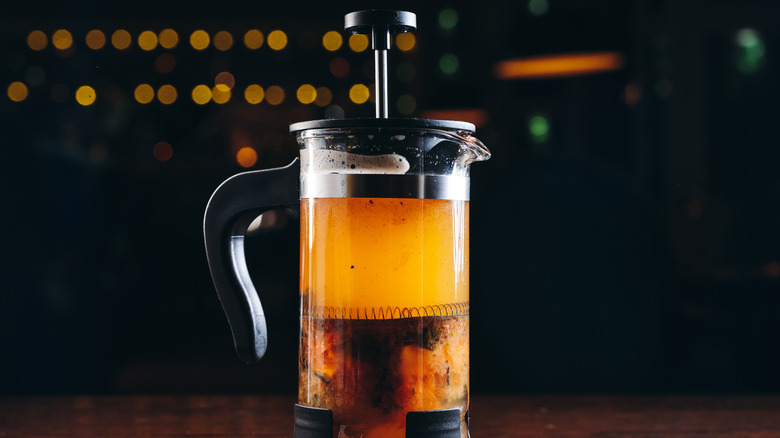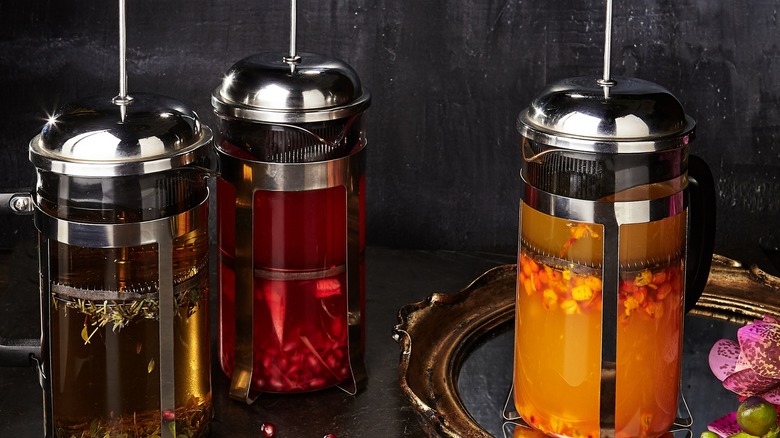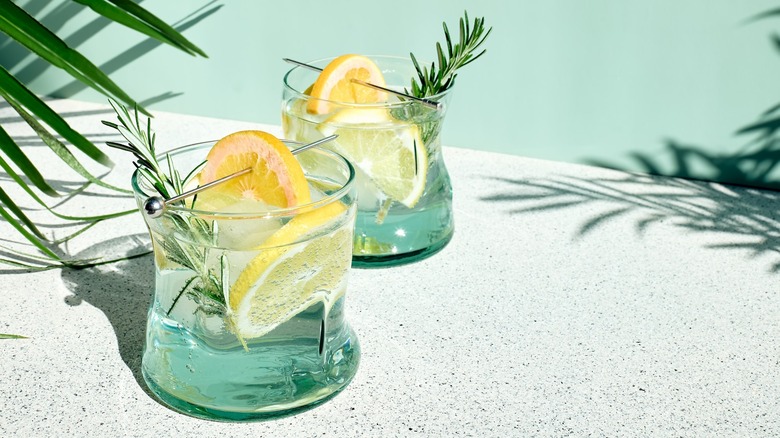Take Out Your French Press To Make Better Cocktails
For many, whipping out a French press for a rich coffee-infused drink is a morning essential. The device's ability to both soak and separate grinds in hot water and create a strong brew without muddying the mug is a thing of beauty. And, if a French press can bring on your AM buzz this well, then it only makes sense that it can deliver in the evening, too. As it turns out, this handy kitchen tool also makes a mean cocktail.
While you can always get away with adding liquid mixers to a cocktail for a basic preparation, there's something to be said about incorporating solid ingredients that can make a drink truly sing. Think of the muddled mint on the bottom of a mojito or the lime and salt squeezed and sprinkled over a margarita — they are truly iconic parts of these classic concoctions.
Now, imagine the world of abilities with a French press, a device that encourages the contents inside to absorb the essence of whatever else is thrown inside, and it's not difficult to see how this handy device can elevate mixology.
The infusion of aromatics creates delectable cocktails
French presses don't just seep flavors into a drink by letting them soak inside. If that was the case, then you could just simply add whatever ingredient you wanted into a cup and let it sit (though when it comes time to drink, those whole bits might not be appetizing). With a French press, the "pressing part" that comes with pushing the device's plunger down creates pressure that aerates the concoction, allowing for a deeper infusion and avoiding any "pulp" from getting into your drink. Alcohol is already a highly effective solvent, so the additional pressure will help transport the flavors of fruit, herbs, and other aromatics like few other methods can do.
The difference between French press coffee (or tea) and cocktails, of course, is that the latter is served chilled the majority of the time. That's not an issue, however — it just means when making a mixed drink, you just have to let the ingredients sit for a bit longer inside the device than you would if you were making a cup of joe. The six- to eight-minute max that you would normally allow for brewing coffee becomes the minimum amount of time that you would allocate for a cold cocktail, with some drinks needing up to 15 minutes to process.
It also helps to muddle the aromatics before adding them to the French press to extract the maximum flavor. And, again, you don't have to worry about little bits getting inside your drink because the filter in the device will separate them out once you plunge it.
Some tips for making cocktails with a French press
Once you've gotten the hang of creating cocktails with a French press, you'll discover that your imagination can run wild. Any kind of fruity drink works, as seen in this Instagram video. This creation presses together peaches, oranges, and cherries with Aperol and prosecco. The concoction is left to sit for two hours in the fridge, though other recipes call for less time. A handy rule of thumb to remember is that the higher the alcohol content, the less time it takes to steep. And conversely, the lower the alcohol content, the more time is needed for the infusion. In this case, since Aperol and prosecco are lighter in ABV than, say, rum or tequila, it makes sense to let the brew sit for a while.
Mixing in a simple non-alcoholic juice, rather than all fruit pieces, will also reduce the time needed, and it will dilute the beverage if you have some heavy alcohols involved. The main point of the French press is to infuse the flavor notes of solid ingredients into alcohol, essentially creating homemade bitters. It's also more efficient to use a shaker to add in any additional mixers after you've already pressed down the drink. Feel free to experiment with other mix-ins, like garden herbs, flower petals, and even spicy peppers, and soon you'll be pressing every drink you serve.



